
In today's fast-paced digital landscape, staying at the forefront isn't just a smart move; it's a must for businesses of all shapes and sizes. Ecommerce has woven itself into the fabric of modern commerce, presenting a plethora of opportunities for growth and global outreach. As we reach the final stages of the year before 2024 rolls around, online retail is primed for even more exciting transformations. To truly shine in this dynamic environment, businesses need top-notch ecommerce tools.
We’ll be taking a deep dive into the expansive world of tools and solutions for all your commerce needs, to help you find the best of the best for the upcoming year. We'll unpack the freshest trends, up-and-coming technologies, and reliable platforms that empower businesses not just to sell, but also market and oversee their online presence as effectively – and efficiently – as possible.
Whether you're a budding entrepreneur gearing up to launch your first online store or a seasoned enterprise determined to keep your competitive edge sharp, this list will be your compass to navigate the essential tools that pave the way for ecommerce excellence in the year ahead. From marketing to analytical tools, messengers, and shopfronts, these 30 top ecommerce tools are a must-see.
What are ecommerce tools?
Ecommerce tools refer to the array of software and technologies that facilitate and enhance various aspects of online commerce or electronic commerce. These tools are designed to help businesses and individuals manage, promote, and optimize their online selling and buying processes. Ecommerce tools cover a wide range of functions and can be used in different stages of the ecommerce business, including setting up an online store, doing a domain name search managing product listings, processing payments, and analyzing sales data.
What types of ecommerce tools are there?
There is a huge range of ecommerce tools out there covering a variety of business needs. Some of the categories include:
Ecommerce platforms: These are comprehensive software solutions that allow businesses to create and manage online stores.
Analytics and reporting tools: These tools provide insights into sales performance, customer behavior, and website traffic, helping businesses make data-driven decisions.
Payment processing tools: These tools enable businesses to accept online payments securely.
Shopping cart software: Shopping cart tools allow customers to select and purchase products from an online store. They often integrate with ecommerce platforms and payment processors.
Inventory management systems: These tools help businesses keep track of their product stock levels, manage product variations, and automate reordering when inventory runs low.
Product information management (PIM) systems: PIM tools help manage and centralize product information, making it easier to maintain consistent and accurate product data across multiple sales channels.
Marketing and SEO tools: Ecommerce businesses use these tools for search engine optimization (SEO), email marketing, social media promotion, and advertising to attract customers and increase sales.
Customer relationship management (CRM) software: Salesforce alternatives like Zendesk, Hubspot etc. are CRM tools that assist in managing customer interactions, tracking leads, and improving customer support and retention.
Shipping and fulfillment solutions: These tools help businesses streamline order processing, shipping, and tracking to ensure timely delivery and customer satisfaction.
Security and fraud prevention tools: Ecommerce businesses use security tools and principles of Zero Trust to protect customer data, prevent fraud, and ensure the safety of online transactions.
Reviews and ratings tools: These tools help collect and display customer reviews and ratings to build trust and credibility.
Customer support and live chat software: To provide real-time customer support and assistance, ecommerce businesses often use live chat and customer support solutions.
Ecommerce plugins and extensions: Many ecommerce platforms allow the integration of third-party plugins and extensions to add specific features and functionality to online stores.
Mobile commerce tools: These tools enable businesses to optimize their websites for mobile devices and develop mobile apps for shopping.
Subscription management tools: Ecommerce businesses that offer subscription-based products or services use these tools to manage recurring billing and customer subscriptions.
Why are ecommerce tools important?
Ecommerce tools are vital for online businesses, serving as the backbone by boosting operational efficiency and saving time. They break down geographical barriers, allowing global reach without the costs associated with physical stores. Cost-effective and flexible, these tools adapt to business growth seamlessly. For customers, they offer unparalleled convenience, enabling anytime, anywhere shopping. Additionally, ecommerce tools facilitate data analysis for informed decision-making, customer engagement through marketing, and security features for trust-building. Effective inventory management, competitive edge in the online marketplace, and easy feedback handling make these tools indispensable for success in the digital age.
Ecommerce platforms
Shopify

Shopify is a robust ecommerce platform known for its user-friendly interface. It provides various features to set up and manage online stores, including customizable templates, product management, inventory tracking, and secure payment processing. Shopify also offers hosting and analytics tools, making it a comprehensive solution for businesses of all sizes.
Key features:
User-friendly interface.
Extensive app store for additional functionality.
Mobile responsiveness.
Built-in payment gateway (Shopify Payments).
Abandoned cart recovery.
Benefits:
Quick setup and easy to use, making it ideal for beginners.
Robust support and community.
Regular updates and improvements.
Hosting is included, reducing the need for separate hosting services.
WooCommerce

WooCommerce is a powerful WordPress plugin that seamlessly integrates with WordPress websites, enabling users to transform their websites into ecommerce stores. It provides extensive customization options, including product management, inventory control, and a variety of payment gateways. WooCommerce is particularly popular among businesses that already have a WordPress presence.
Key features:
WordPress integration.
Extensive plugin ecosystem.
Customizable design.
Secure and regularly updated.
Content and commerce integration.
Benefits:
Seamless integration with WordPress.
Scalable for small to medium-sized businesses.
Large community support.
No licensing fees, but additional plugins may have costs.
Adobe Commerce (Magento)
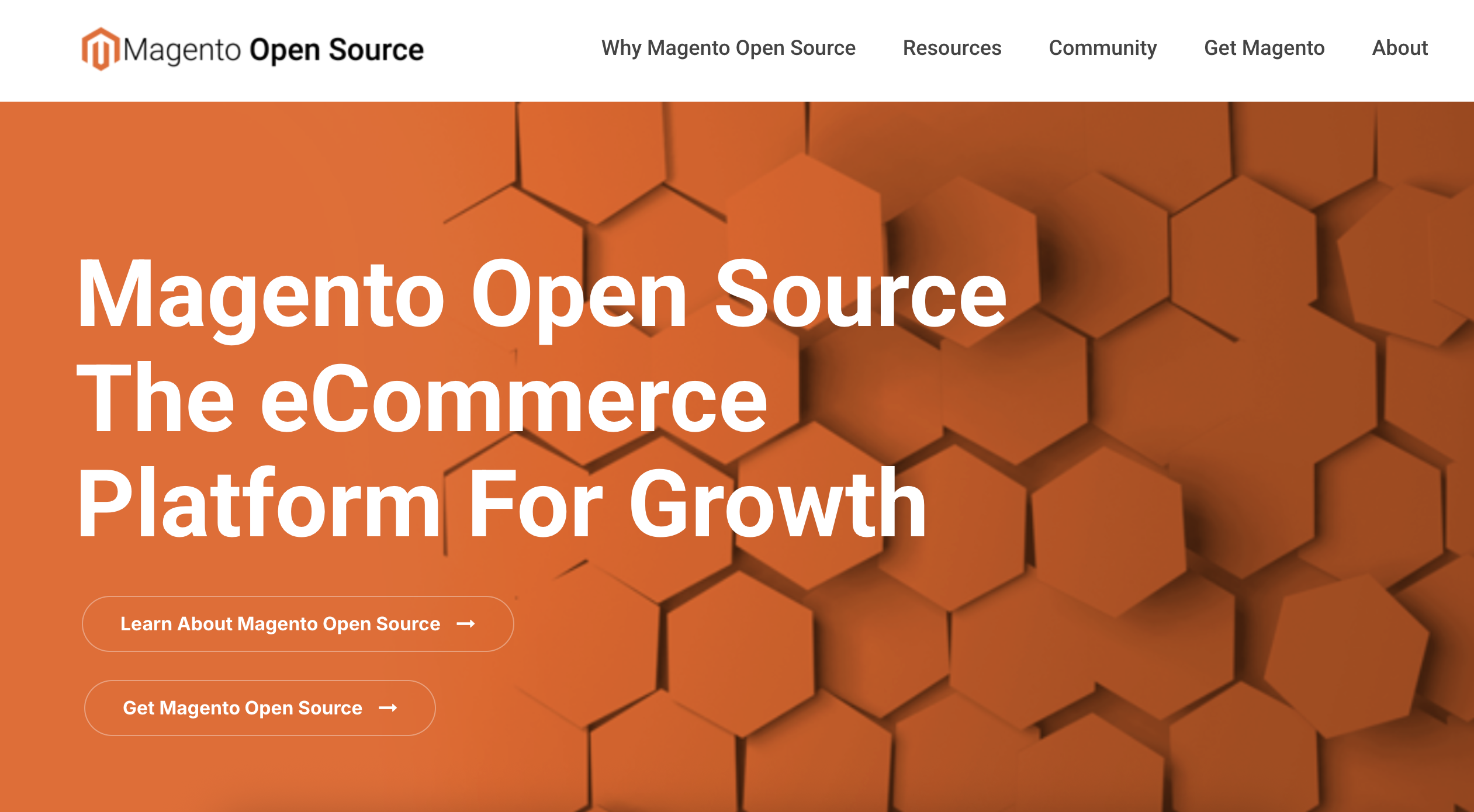
Magento, now known as Adobe Commerce, is a highly customizable open-source ecommerce platform, ideal for businesses with complex requirements. It offers advanced features for product catalog management, inventory control, and order processing. It’s also known for its scalability, making it suitable for large enterprises and ambitious online businesses.
Key features:
Highly customizable with a wide range of extensions.
Scalable for large enterprises.
Open-source, giving developers greater control.
Multi-store capabilities.
Advanced SEO features.
Benefits:
Ideal for large and complex ecommerce sites.
High level of flexibility and customization.
Active community support.
Strong SEO capabilities.
BigCommerce

BigCommerce is a cloud-based ecommerce platform that balances user-friendliness with flexibility. It offers a range of built-in features, such as product management, order fulfillment, and payment processing. BigCommerce is known for its scalability and the ability to handle online stores of varying sizes.
Key features:
Built-in features for SEO and marketing.
Multi-channel selling capabilities.
Responsive themes.
Secure and PCI compliant.
Abandoned cart recovery.
Benefits:
No transaction fees.
Suitable for businesses of all sizes.
Regular updates and improvements.
24/7 customer support.
Robust features for enterprise-level businesses.
Wix

Wix is a popular website builder that includes ecommerce functionality. Users can create visually appealing online stores with ease, thanks to its drag-and-drop builder and customizable templates. Wix offers features for product listings, inventory management, and payment processing.
Key features:
Drag-and-drop website builder.
Wix ADI (Artificial Design Intelligence) for easy setup.
App market for additional features.
Secure online payments.
Mobile optimization.
Benefits:
Intuitive and user-friendly for beginners.
No coding skills required.
All-in-one platform (hosting, domain, etc.).
Quick setup for small to medium-sized stores.
Squarespace

Squarespace is another website builder that integrates ecommerce capabilities. It is known for its aesthetically pleasing templates and user-friendly design tools. Squarespace enables businesses to create visually stunning online stores with features like product management and secure payment processing.
Key features:
Elegant and customizable templates.
Integrated blogging platform.
Built-in analytics.
Mobile responsive design.
Secure checkout process.
Benefits:
Beautiful design options suitable for creative businesses.
All-in-one platform with hosting included.
Easy to manage content and products.
Good for smaller ecommerce stores with a focus on design aesthetics.
Marketing and SEO
HypeAuditor

HypeAuditor is an all-in-one influencer marketing platform offering specific features to boost the marketing capabilities of ecommerce businesses. These include integration software with Shopify to automatically generate and assign affiliate links and discount codes to share with influencers, making it easier to run affiliate marketing campaigns. Additionally, they offer the ability to analyze competitors' businesses, discover suitable influencers for campaigns, analyze content creators’ performance metrics and collaboration prices, and a host of other solutions within their all-encompassing platform.
Key features:
Influencer marketing analytics.
Fraud detection for influencers.
Audience demographics and engagement metrics.
Campaign tracking and reporting.
Competitor analysis.
Benefits:
Identify genuine influencers and followers.
Improve the effectiveness of influencer marketing campaigns.
Analytics for better decision-making.
Fraud prevention for influencer partnerships.
Dedicated integration with major ecommerce platforms
Mailchimp

Mailchimp is more than just an email marketing platform; it's a versatile marketing tool used by businesses of all sizes. With its user-friendly interface, Mailchimp makes it easy to create, send, and analyze email campaigns. Businesses can design visually appealing newsletters, segment their email lists, and track the performance of their email marketing efforts. What sets Mailchimp apart is its marketing automation capabilities, enabling businesses to automate various aspects of their marketing strategy, from personalized email sequences to lead nurturing. This tool simplifies the entire email marketing process, making it an ideal choice for both beginners and experienced marketers.
Key features:
Email marketing campaigns.
Marketing automation.
Contact management and segmentation.
A/B testing for campaigns.
Analytics and reporting.
Benefits:
User-friendly interface.
Automation for personalized customer journeys.
Integration with ecommerce platforms.
Detailed analytics for email performance.
HubSpot

HubSpot is an all-in-one marketing platform encompassing various essential marketing tools, making it a comprehensive solution for businesses seeking to streamline their marketing efforts. It offers not only email marketing but also customer relationship management (CRM), marketing automation, and content marketing tools. HubSpot's CRM allows businesses to manage and track interactions with leads and customers, while its email marketing features enable the creation of engaging email campaigns. Additionally, HubSpot's marketing automation tools help nurture leads through the sales funnel, and its content marketing tools empower businesses to create, publish, and analyze content across multiple channels.
Key features:
Marketing automation.
CRM (Customer Relationship Management).
Content management and creation.
Social media management.
Sales and customer service tools.
Benefits:
All-in-one platform for marketing, sales, and customer service.
Integration with various third-party apps.
Personalized customer experiences.
Advanced analytics and reporting.
SEMrush

SEMrush is an indispensable tool for businesses looking to enhance their online visibility and search engine rankings. While it's renowned for its SEO capabilities, SEMrush offers a broader suite of marketing features. Its keyword research tools help businesses identify the most relevant search terms and phrases to target. Competitive analysis tools allow them to understand their competitors' strategies. SEMrush's website audit feature helps in identifying and rectifying issues that may affect website performance. With its wide array of analytics and reporting, businesses can monitor the impact of their marketing efforts and make data-driven decisions to improve their online presence.
Key features:
Keyword research and tracking.
Competitor analysis.
Site audit and backlink analysis.
Position tracking.
Advertising research.
Benefits:
Comprehensive SEO toolkit.
In-depth competitor insights.
Advanced keyword research and tracking.
PPC and display advertising insights.
Klaviyo

Klaviyo specializes in email marketing tailored specifically for ecommerce businesses. It equips businesses with a suite of email marketing tools designed to boost customer engagement and increase sales. Klaviyo offers powerful email automation, enabling businesses to create personalized email sequences triggered by customer behavior and preferences. It also provides robust segmentation options, allowing businesses to send targeted emails to specific customer segments. The analytics tools offered by Klaviyo help businesses track the performance of their email campaigns, making it easier to refine and optimize their email marketing strategy to increase ROI and drive more ecommerce sales.
Key features:
Email marketing campaigns.
Marketing automation.
Segmentation and targeting.
Integration with ecommerce platforms.
Analytics and reporting.
Benefits:
Specialized for ecommerce businesses.
Personalized customer experiences.
Revenue tracking from email campaigns.
Advanced segmentation for targeted marketing.
Yoast SEO (WordPress Plugin)
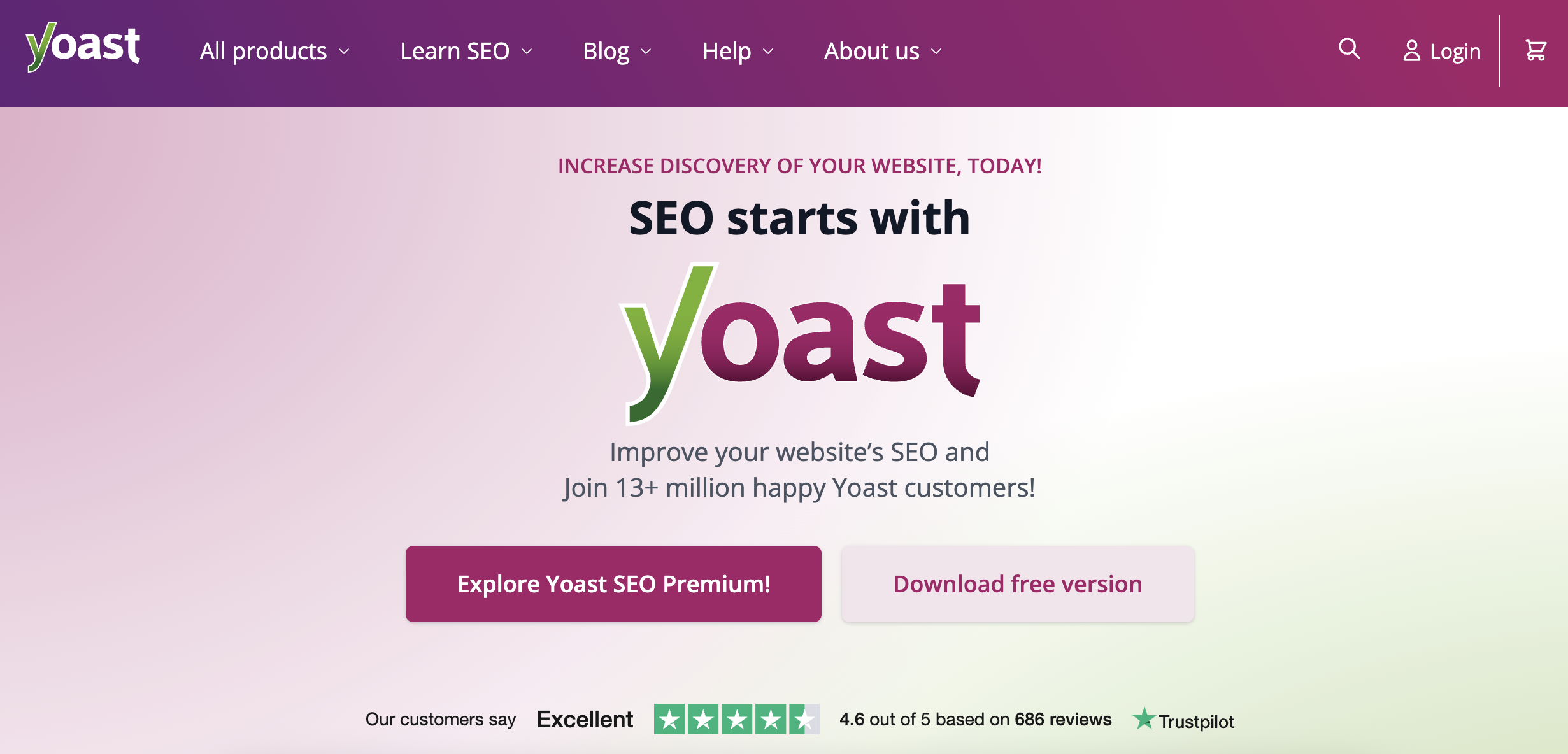
Yoast SEO is an essential plugin for WordPress users looking to optimize their websites for search engines. It offers a wide range of features to enhance on-page SEO. With Yoast, businesses can receive real-time recommendations for improving the SEO of their content. The plugin analyzes content for readability and keyword optimization, making it easier to create content that ranks well in search engine results. Additionally, Yoast SEO generates XML sitemaps, which facilitate search engine indexing and improve website visibility in search results. Whether you're a seasoned SEO professional or new to the game, Yoast SEO can significantly boost your website's search engine rankings and organic traffic.
Key features:
On-page SEO analysis.
XML sitemap generation.
Readability analysis.
Social media integration.
Breadcrumb navigation.
Benefits:
Improves on-page SEO for WordPress websites.
Provides actionable suggestions for content optimization.
Helps with website readability and user experience.
Social media integration for better content sharing.
Payment Processing
Stripe

Stripe stands out as a highly versatile payment processing solution, celebrated for its developer-friendly approach. It excels in supporting a wide array of online and mobile payment methods. What sets Stripe apart is its unwavering commitment to customization, offering businesses a toolkit of developer tools to ensure seamless integration with their ecommerce websites. This translates to an efficient and personalized payment processing experience for customers. Stripe goes the extra mile in prioritizing security, providing a robust payment gateway that businesses can trust to safeguard transactions while facilitating business growth.
Key features:
Comprehensive set of APIs for developers.
Supports various payment methods (credit cards, ACH, etc.).
Quick and easy setup.
Strong security measures (PCI compliance).
Subscription billing support.
Benefits:
Developer-friendly with extensive documentation.
Transparent pricing with no monthly fees.
Scalable for businesses of all sizes.
Real-time data and analytics.
PayPal

PayPal holds a distinguished place in the online payment landscape, recognized and trusted by businesses and consumers alike. It provides a secure and reliable platform for conducting payment transactions through multiple channels, including credit cards and PayPal accounts. One of its key advantages is the simplicity of integration with ecommerce websites, making it a favored choice for businesses of all sizes. The convenience and versatility offered by PayPal enable businesses to offer a range of payment options to customers, ultimately enhancing the shopping experience and driving increased sales.
Key features:
Wide acceptance globally.
Buyer and seller protection.
Express Checkout for a streamlined process.
Mobile payments with One Touch.
Integration with various ecommerce platforms.
Benefits:
Trusted and widely accepted payment method.
User-friendly for both customers and businesses.
Buyer and seller protection for secure transactions.
Versatile with various integration options.
Global reach with multi-currency support.
Square

Square, renowned for its excellence in point-of-sale solutions, extends its capabilities to encompass online payment processing. It offers businesses the flexibility to accept payments not only in the digital realm but also in physical brick-and-mortar stores. Square's comprehensive platform encompasses a diverse set of features, including payment processing, invoice generation, and efficient sales management. This holistic approach makes Square an ideal choice for businesses seeking a well-rounded payment processing solution that simplifies their financial operations, whether online or offline.
Key features:
Point-of-sale (POS) solutions for in-person transactions.
Online payments and ecommerce integration.
Invoices and recurring payments.
Virtual Terminal for phone and mail orders.
Square Reader for contactless and chip payments.
Benefits:
Seamless integration between online and offline payments.
Clear and transparent pricing.
User-friendly interface for both merchants and customers.
Inventory management for retail businesses.
Klarna

Klarna is a flexible payment service that allows customers to choose from various payment options, including "buy now, pay later" (BNPL). Klarna handles transaction processing, assesses risk, and settles payments to retailers. It provides data analytics, fraud prevention, and customer support. Retailers benefit from increased sales, and customers enjoy flexible payment choices. It's essential for users to understand the terms, including interest rates and fees associated with BNPL options.
Key features:
Buy now, pay later options.
Financing and installment payment plans.
Seamless checkout experience.
Minimal personal information required.
Risk management and fraud prevention.
Benefits:
Increased conversion rates with flexible payment options.
Improved customer experience with deferred payments.
Higher average order value.
Integration with various ecommerce platforms.
Shopping Cart Software
OpenCart

OpenCart is a highly customizable open-source shopping cart solution, perfect for businesses of all sizes. It offers an intuitive cart system that allows customers to browse products, add items to their carts, and easily proceed to checkout. Its flexibility and adaptability make it a versatile choice for a wide range of online stores.
Key features:
Intuitive and user-friendly admin interface.
Multi-store functionality.
Extensive extension marketplace.
Supports various payment gateways.
SEO-friendly features.
Benefits:
Quick installation and setup.
Lightweight and fast performance.
Responsive design for mobile compatibility.
Active community support.
Cost-effective for small to medium-sized businesses.
PrestaShop

PrestaShop features an integrated shopping cart system designed to simplify the customer purchasing process. It offers cart management, order review, and secure checkout features, making it adaptable to various ecommerce needs. Businesses appreciate its user-friendliness and versatility, making it a practical choice for different industries and store sizes.
Key features:
Modular architecture for easy customization.
Multi-store management.
Abandoned cart recovery.
Detailed product and inventory management.
Extensive theme and module marketplace.
Benefits:
Scalable for businesses of various sizes.
Robust feature set out of the box.
SEO-friendly structure for better search rankings.
Active community and support forums.
Supports a wide range of payment gateways.
Inventory Management
Quickbooks

Quickbooks is an inventory management solution that helps businesses keep track of their product stock levels. It includes features for inventory control, order management, and B2B ecommerce capabilities. TradeGecko is ideal for businesses looking to streamline their supply chain processes.
Key features:
Accounting functionalities for small to medium-sized businesses.
Invoicing and expense tracking.
Payroll processing (with additional subscription).
Tax preparation and reporting.
Benefits:
User-friendly interface.
Integration with various third-party apps.
Cloud-based, allowing access from anywhere.
Regular updates and improvements.
Strong financial reporting capabilities.
Zoho Inventory

Zoho Inventory is a cloud-based inventory management solution that centralizes inventory data and provides tools for multichannel selling. It allows businesses to monitor stock levels, automate order processing, and integrate with various ecommerce platforms and marketplaces.
Key features:
Inventory tracking and management.
Order fulfillment and shipping.
Multi-channel selling support.
Purchase and sales order management.
Integration with Zoho's suite of business applications.
Benefits:
Scalable for small to medium-sized businesses.
Affordable pricing plans.
Automation of repetitive tasks.
Multi-currency and multi-warehouse support.
Real-time tracking and reporting.
Cin7

Cin7 offers comprehensive inventory management with features for order processing and integration with multiple sales channels. It provides real-time visibility into inventory and helps businesses optimize stock levels and order fulfillment.
Key features:
Comprehensive inventory management.
Order and warehouse management.
Integration with various sales channels.
Reporting and analytics tools.
B2B ecommerce capabilities.
Benefits:
Suitable for a range of industries, including retail and wholesale.
Automation of inventory processes.
Real-time visibility across the supply chain.
Integration with popular ecommerce platforms.
Advanced features for complex inventory needs.
Shipping and Fulfillment
ShipStation
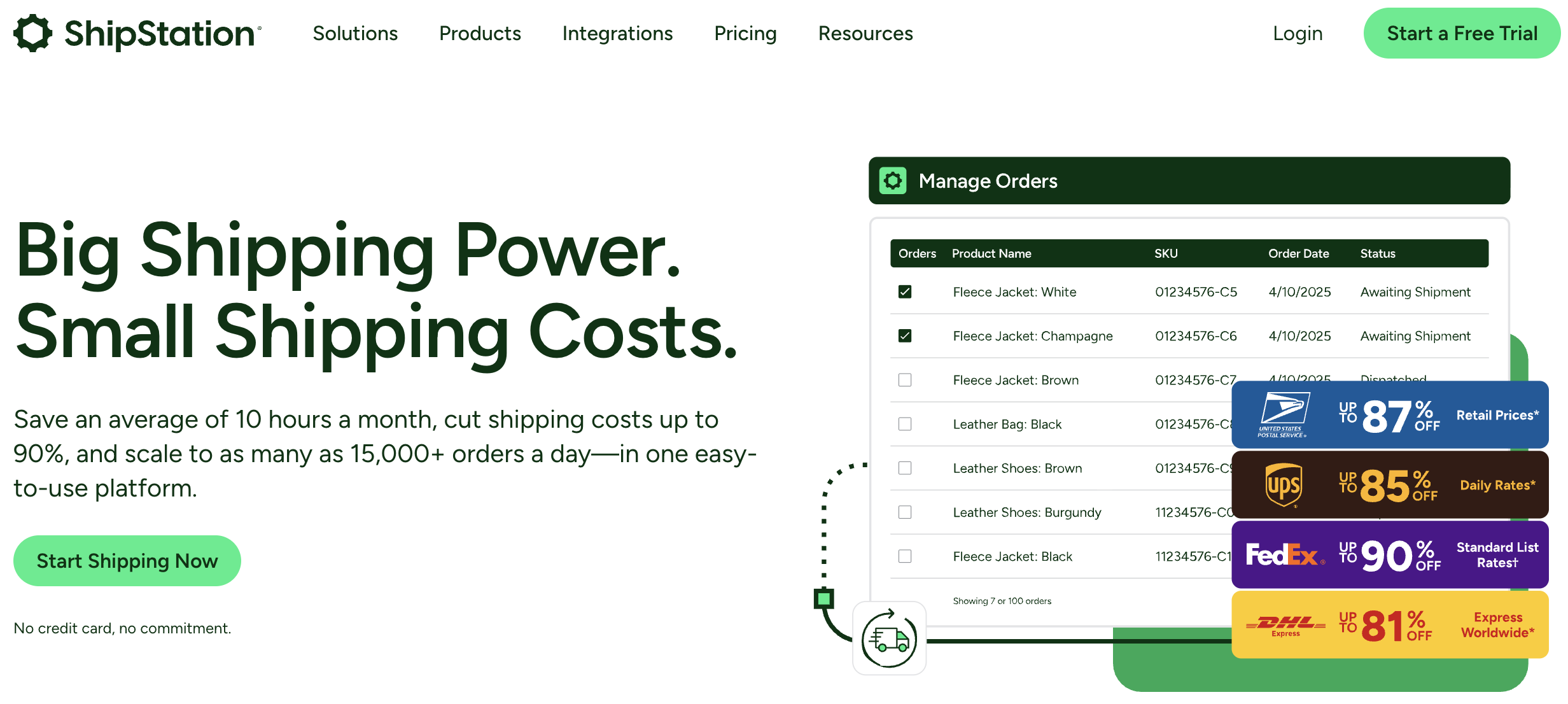
ShipStation is a shipping software that simplifies order fulfillment processes. It offers features such as order management, label printing, and order tracking. ShipStation integrates with multiple carriers, making it a valuable tool for ecommerce businesses with shipping needs.
Key features:
Multi-carrier shipping platform.
Order and shipment tracking.
Automation of shipping processes.
Customized shipping labels and packing slips.
Integration with various ecommerce platforms.
Benefits:
Streamlined order fulfillment.
Centralized platform for managing orders and shipments.
Real-time shipping rates and carrier options.
Batch processing for efficiency.
Reporting and analytics for shipping performance.
Shippo

Shippo is a platform that focuses on managing shipping and carrier integrations. It enables businesses to access a variety of shipping options, print shipping labels, and track shipments. Shippo streamlines the shipping process and offers competitive shipping rates.
Key features:
Multi-carrier shipping API.
Label generation and printing.
Rate comparison across carriers.
International shipping support.
Address validation and correction.
Benefits:
Easy integration with ecommerce platforms.
Customizable shipping options.
Real-time tracking information.
Simplified returns processing.
Scalable for businesses of various sizes.
Easyship
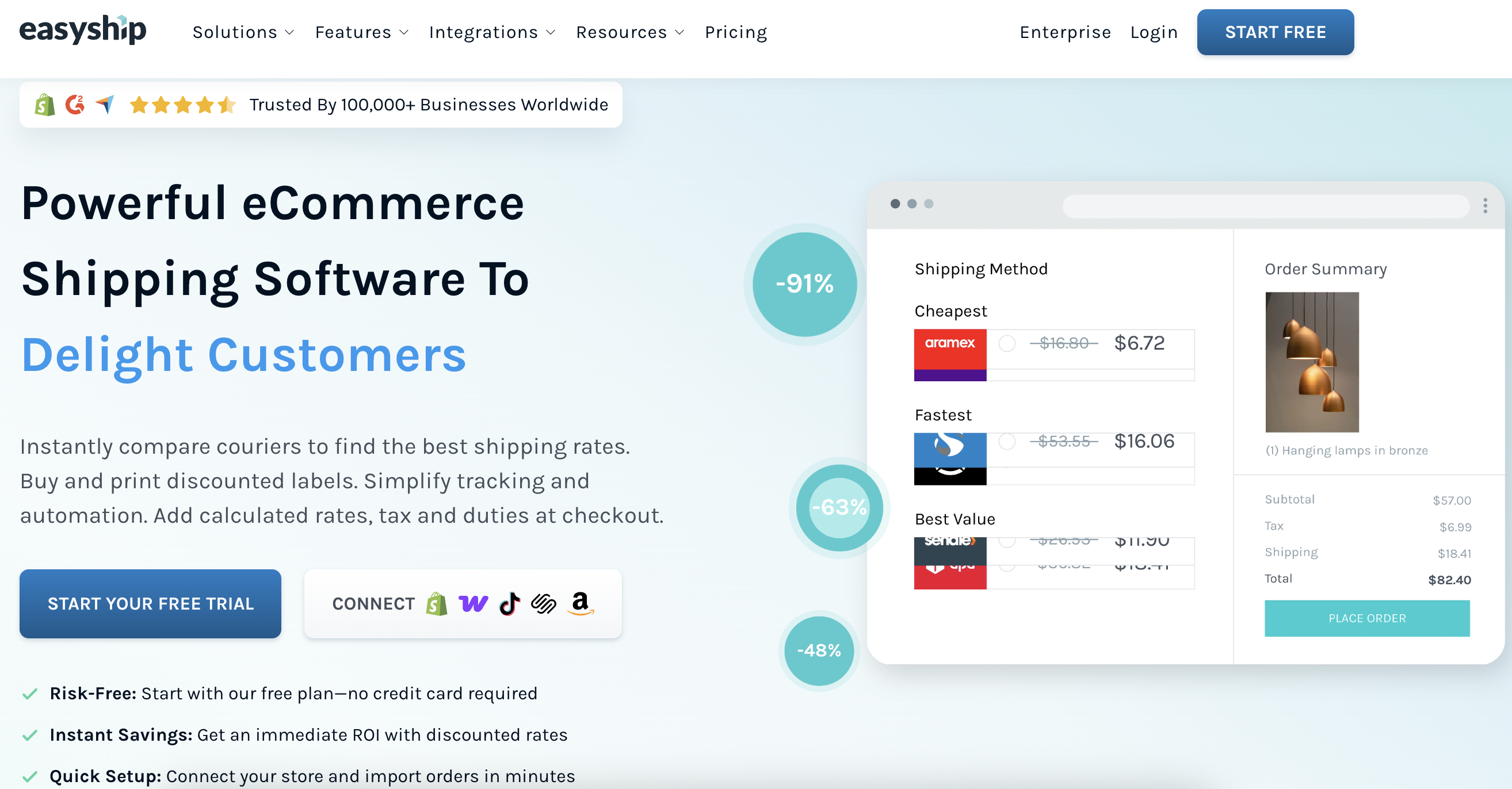
Easyship provides a comprehensive solution for comparing, booking, and tracking shipments. It connects businesses with a network of couriers, allowing them to choose the most cost-effective and efficient shipping options for their needs.
Key features:
Multi-carrier shipping platform.
Transparent shipping rates.
Duty and tax calculations for international shipping.
Automated customs documentation.
Integration with various ecommerce platforms.
Benefits:
Access to a network of couriers.
Cost-effective shipping solutions.
Real-time tracking and notifications.
Simplified cross-border shipping.
Dashboard for analytics and insights.
ShipBob
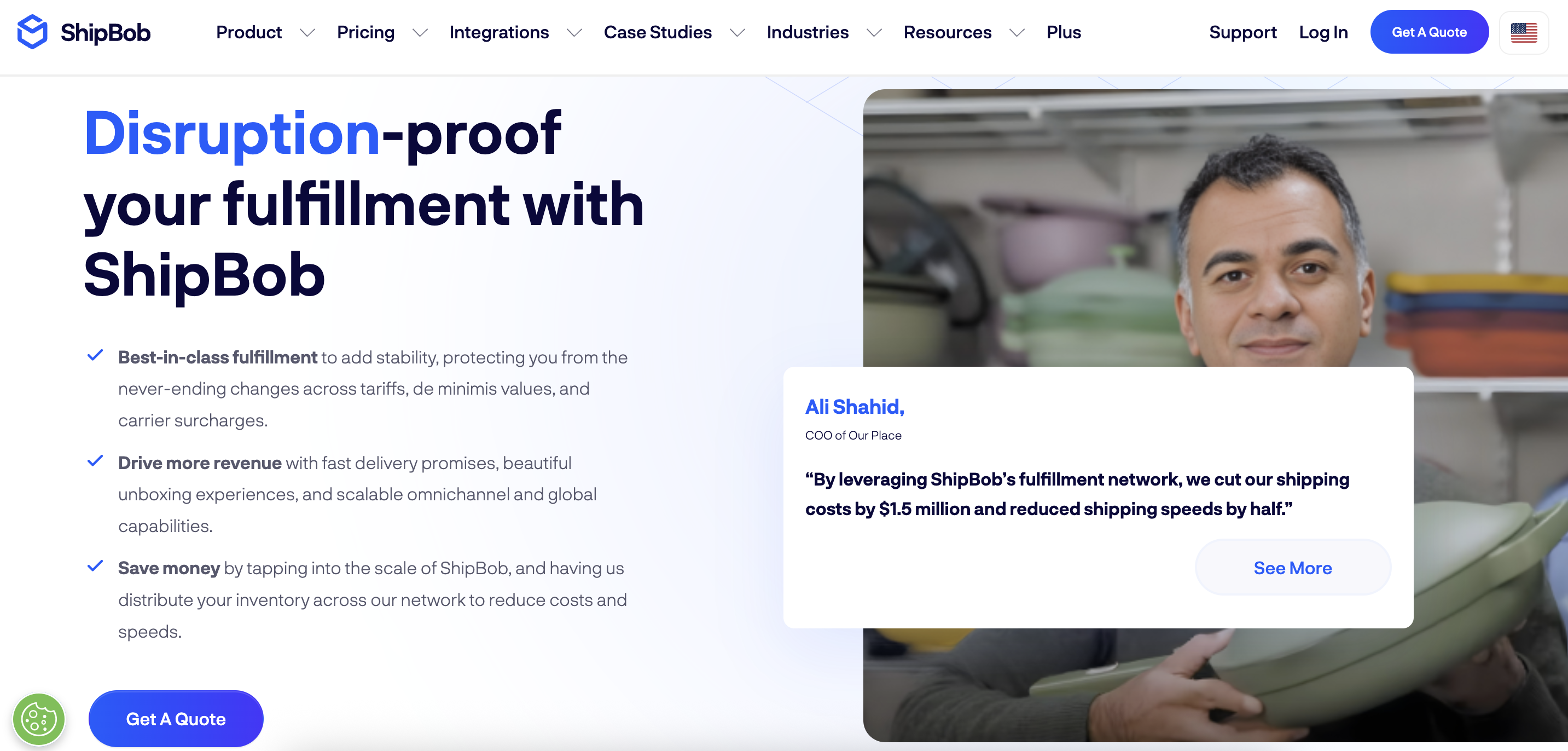
ShipBob is a fulfillment service that offers warehousing and shipping solutions. It's designed to help ecommerce businesses outsource their order fulfillment and inventory management. ShipBob stores products in fulfillment centers and handles the packing and shipping of orders.
Key features:
Order fulfillment and shipping services.
Warehousing and inventory management.
Integration with popular ecommerce platforms.
2-day shipping network.
Real-time order and inventory tracking.
Benefits:
Outsourced fulfillment for efficiency.
Reduced shipping costs with bulk rates.
Scalable for growing businesses.
Geographic coverage for faster shipping.
Advanced analytics for performance monitoring.
Stamps.com

Stamps.com is a platform that allows businesses to print postage and shipping labels directly from their computers. It simplifies the shipping process, offering postage discounts and integration with major carriers like USPS, FedEx, and UPS.
Key features:
Online postage printing.
Address verification.
Batch processing for large volumes.
Integration with various ecommerce platforms.
USPS postage discounts.
Benefits:
Convenience of printing postage from home or office.
Cost savings on USPS postage.
Time-saving batch processing.
Access to USPS shipping services.
Integration with popular shipping carriers.
Customer Support and Engagement
Zendesk

Zendesk is a customer support platform that offers helpdesk, live chat, and ticketing solutions. It enables businesses to provide efficient customer support and engage with customers across various channels.
Key features:
Ticketing system for managing customer queries.
Multi-channel support (email, chat, social media).
Knowledge base for self-service support.
Automation of routine tasks.
Reporting and analytics.
Benefits:
Centralized platform for customer support.
Seamless integration with various communication channels.
Customizable workflows and automations.
Collaboration tools for support teams.
Scalable for businesses of different sizes.
LiveChat

LiveChat is a live chat and chatbot solution that facilitates real-time communication with customers. It's used to provide immediate support and engage with website visitors.
Key features:
Real-time chat for website visitors.
Chatbots for automated responses.
File sharing and co-browsing.
Ticketing system for offline queries.
Integration with various platforms.
Benefits:
Improved customer engagement on the website.
Proactive customer support with chat invitations.
Detailed visitor information and analytics.
Easy to set up and use.
Mobile apps for on-the-go support.
Gorgias

Gorgias is a helpdesk and customer support platform designed specifically for ecommerce businesses. It integrates with various ecommerce platforms and streamlines customer support operations.
Key features:
Unified customer support platform.
Integration with ecommerce platforms.
Automated responses with AI.
Customer data and order history within the ticket.
Macros for quick responses.
Benefits:
Streamlined support for ecommerce businesses.
Automation of repetitive tasks.
Integration with various customer communication channels.
AI-powered insights for personalized support.
Time-saving features for customer service agents.
Freshdesk
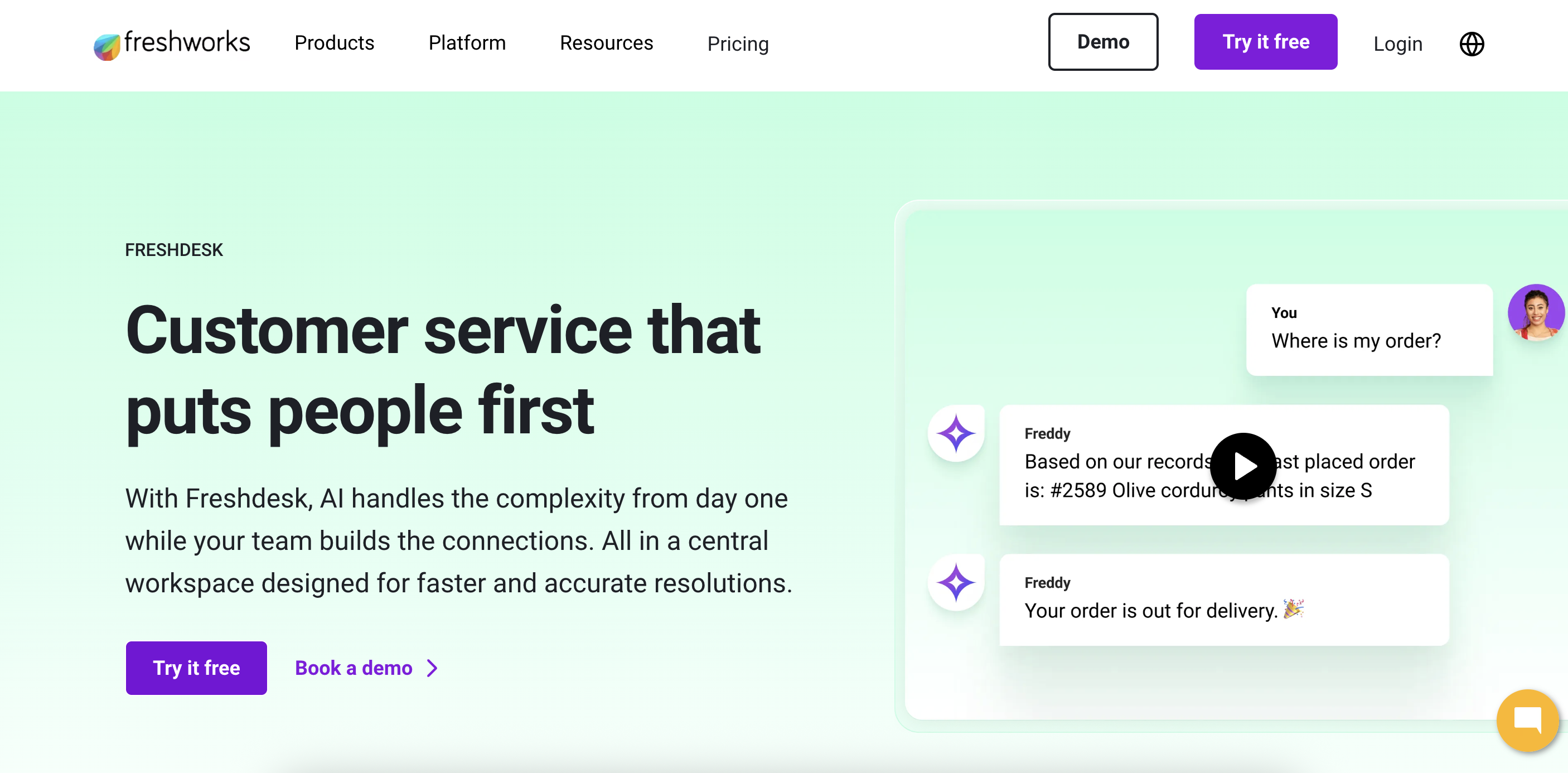
Freshdesk is a cloud-based customer support platform that provides features for managing customer inquiries, tickets, and support requests. It's suitable for businesses of all sizes and industries.
Key features:
Multi-channel support (email, chat, phone).
Ticketing system with automation.
Knowledge base for self-service.
Collaboration tools for internal communication.
Reporting and analytics.
Benefits:
Easy setup and user-friendly interface.
Customizable workflows and automations.
Integration with third-party applications.
Scalable for businesses of different sizes.
Mobile apps for remote support.
Conclusion
The landscape of ecommerce is continually evolving, and businesses today have access to a rich array of powerful tools and solutions to drive success. From user-friendly ecommerce platforms like Shopify and WooCommerce to marketing and analytics tools like SEMrush and HypeAuditor, the options are diverse and adaptable.
Choosing the right ecommerce tools can be the difference between thriving in the digital marketplace and struggling to keep up. These tools streamline operations, expand market reach, enhance customer experiences, and provide invaluable insights for informed decision-making. They are the foundation upon which successful ecommerce ventures are built. Businesses that leverage these tools wisely will find themselves well-positioned for growth and sustained success, ensuring that they can confidently embrace the future of online commerce.















